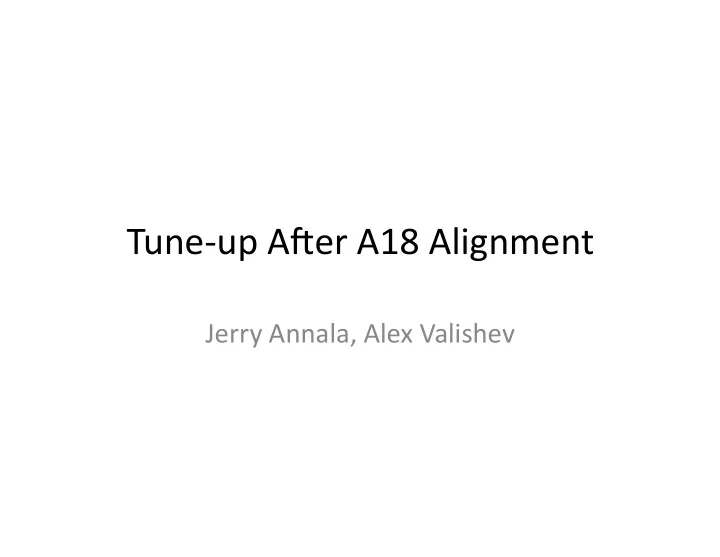

Tune‐up A)er A18 Alignment Jerry Annala, Alex Valishev
Pre‐Alignment Thoughts and Studies • A)er the shutdown VA18 was running at ‐45A, which is consistent with +3 mm quad offset. Alignment data showed +2.5 mm. • A18 BPM showed ‐1.5 mm offset w.r.t. nominal orbit. Thus, total offset would be 3‐1.5=+1.5 mm. • Primary moMvaMon for re‐alignment was to lower the corrector current • The A18 spool contains two sextupoles (S5 and SDA2U). VerMcal orbit offset at a sextupole produces differenMal coupling and differenMal orbit kick in the horizontal plane. This leads to a change of the proton/pbar laVce and helix. This was verified in the 11/17 EOS study. • Re‐alignment of the quad would move the orbit through the spool to its original locaMon.
VerMcal 4‐bump at A18. 11/17 EOS +1.5 bump ‐ Nominal Nominal ‐ ‐1.5 mm bump
VerMcal 4‐bump at A18. 11/17 EOS PosiMve bump + NegaMve bump
Tune‐up A)er Re‐Alignment • VA18 current was decreased by amount consistent with .060” move • No coupling or tune adjustment was needed up the ramp or through the squeeze. • VerMcal 4‐bump at A18 had no effect on tunes/coupling at either helix • Losses at sequence 15 seem to be beber • Collision opMcs was very much mis‐tuned – found coupling on the proton helix .006, on the pbar helix 0.01. – S7 had some effect on pbar helix (new effect) – SQ was efficient on the proton orbit. – DifferenMal effect of D0 skew quads (+ for pbars, ‐ for protons) did not change • Tunes are un‐crossed • Proton blowup at lbseq=15
Next Steps • Understand orbit offset in the spool • Repeat in‐store orbit bumps to measure the cross‐plane response • LowBeta opMcs measurement – Why are tunes uncrossed? – What is the reason for large difference in pre‐ and post‐ shutdown tune seVngs? e.g. proton verMcal tune seVng changed by ‐0.007, pbar verMcal by ‐.0006 • Tune mult calibraMon could help
Recommend
More recommend